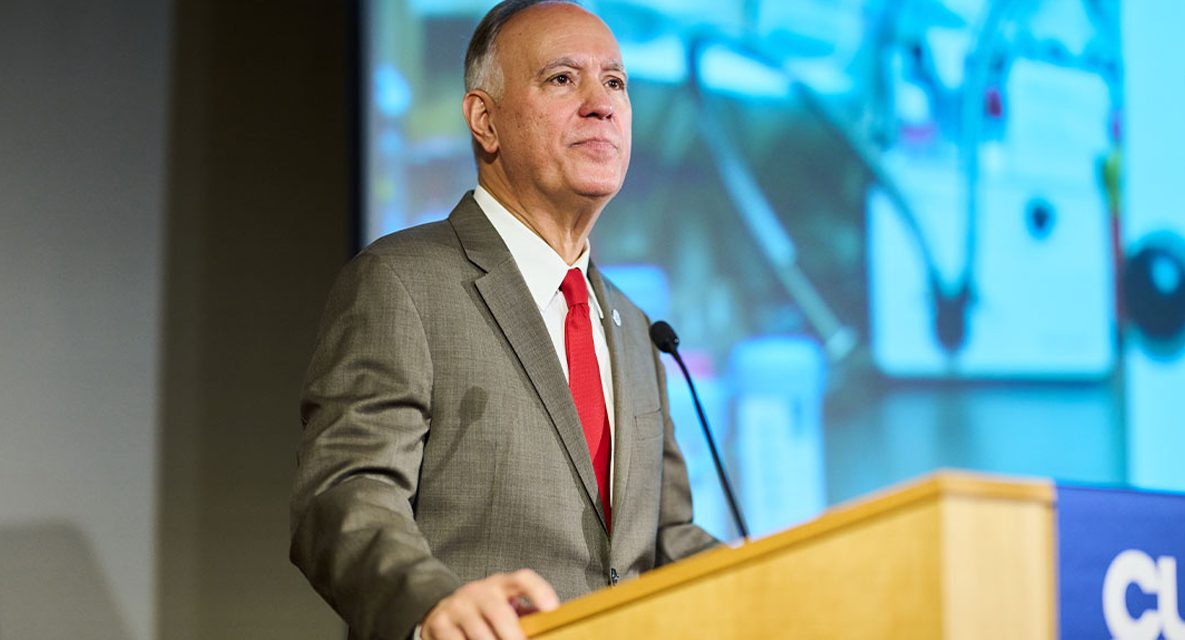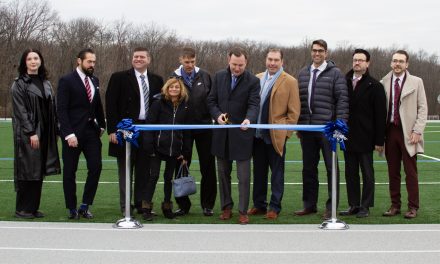A Year When We Broke Records, Launched Ambitious Plans and Helped Countless Students Achieve Their Dreams
For CUNY, 2023 was an invigorating year of accolades, achievement and ambition.
The University and its colleges won new acclaim as a trailblazing force for educational opportunity and affordability. Turning a corner on the pandemic, CUNY saw the first enrollment increases in three years and grew in ways that reflected the breadth of the University and its impact on New York: There were numerous new initiatives to bolster student success and connect more graduates to the city’s employers. The University added 251 new faculty and had a record year of funding for its burgeoning research enterprise.
And in the midst of it all, CUNY looked ahead in a big way, making 2023 a year of renewed commitment to the city it has served for 175 years. In June, the University unveiled its vision for the future with “CUNY Lifting New York,” a strategic roadmap for reshaping the student experience from enrollment to graduation and intensifying CUNY’s role as a New York institution that is indispensable to the future of the city itself.
The promise and the progress of this year was showcased in a new interactive college ranking tool developed by The New York Times that placed six CUNY colleges as tops in the nation when you consider a combination of academics, affordability, diversity and high post-attendance earnings. Eight CUNY campuses, meanwhile, were among the Forbes 2023 list of “25 Colleges That Deliver a High Bang for Your Tuition Buck.”
And five CUNY community colleges were named among the top 150 community colleges in the nation by the Aspen Institute. In a year when increasing numbers of Americans were asking whether college is worth the high cost, CUNY continued to offer New Yorkers of all backgrounds a degree for every dream at a price they can afford.
Maintaining Access by Increasing Enrollment and Retention
2023 marked a milestone for the University.
Freshman enrollment increased by more than 4% this fall — the first increase since the onset of the pandemic in 2020. The upswing, which Chancellor Matos Rodríguez announced during his State of the University speech, means more New Yorkers have a path to a better future.
This great news paired with the success of the CUNY Reconnect Program, which surpassed its re-enrollment goal with more than 26,000 students signing up. This popular program encourages New Yorkers with college credits but no degree to re-enroll.

CUNY understands how critically important maintaining access to a quality affordable education is to the vitality of our diverse city. That’s why in 2023, for the first time in the system’s history, Chancellor Matos Rodríguez partnered with NYC Public Schools Chancellor David C. Banks to send personalized welcome letters to all New York City public high school seniors who are on pace to graduate in 2024.
Not only did the letters offer students admission to the University’s community colleges, they also announced that CUNY waived the application fee for the month of October. The results were tremendous: Freshman applications for Fall 2024 increased 386% from the previous October.
The Chancellor also credited our massive advertising campaign that ran on subways, buses, railroads and more, A Degree for Every Dream, which featured more than 60 CUNY students as models, for the jump.
Expanding the Employment Pipeline
The Chancellor reaffirmed his commitment to strengthen the University’s employment pipeline and ensure employers see, “CUNY campuses as fertile ground for recruitment.”

Noteworthy gains toward that goal in 2023 included the launch of Spring Forward. Funded by Gov. Kathy Hochul, the program has placed 600 CUNY students in paid positions with new businesses and storied institutions like Mount Sinai, offering access to careers in vital fields like environmental preservation, healthcare, and STEM.
Similarly, a new partnership with the MTA will provide students in each borough with hands-on experience with North America’s largest transportation network.
The University also grew its ties with private sector employers. One example is the collaboration between the New York Jobs CEO Council, Amazon Web Services, the Mayor’s Office of Talent and Workforce Development and CUNY to transform tech education at Queensborough, BMCC, and CSI, ensuring their curricula align with entry-level jobs in software engineering, cloud support, cyber security, and data integration.
This was not the only instance of the University’s deepening partnership with Amazon, evidenced by the opening of its New York Tech Hub, which will provide class and event space for our 25 associated campuses.
The University also received a boost in expanding equitable access to careers in technology, through the new CUNY Tech Equity Initiative, a partnership with Google that will give CUNY students increased access to career resources and paid internship opportunities. Finally at the close of the year, the Mayor announced another $10 million to scale the successful CUNY 2x Tech initiative to additional CUNY campuses.
The Chancellor also announced the launch of the University-wide Careers Across the Disciplines initiative, a faculty-led effort to integrate career connections into classrooms and degree paths across CUNY. This includes $1.8 million from the State to embed paid internships into degree programs. Gov. Hochul also invested $2 million to add 12 paid apprenticeship programs at all 10 CUNY colleges that offer associate degrees, enabling students to earn course credits and firsthand experience at companies in-demand industries.
Reshaping Student Success
CUNY continued to provide students tools to succeed academically, physically, mentally and socially.
Many of these supports have been recognized as effective and successful models and offer students the chance to receive valuable career experience by working as peer mentors. The College & Career Bridge for All summer peer mentoring collaboration, launched in 2017, matches recent high school graduates with college students to reduce “summer melt,” whereby high school seniors apply to and are accepted at colleges, but ultimately do not enroll in the fall.
A 2023 study showed that students who connected with a mentor from the program were significantly more likely to enroll in college than those who did not. CUNY College & Career Advising Fellows, which launched this year, built on its success, hiring recent CUNY graduates as Fellows to work in-person and virtually at NYC Public Schools offering personalized advising to juniors and seniors. Both initiatives aim to increase students’ enrollment in college and career readiness programs.

The University also launched CUNY CARES, a three-year pilot program at CUNY’s three Bronx campuses that is designed to boost academic success by providing integrated access to health care, mental health treatment, food and housing assistance. Students work as peer advocates to spread the word about campus and community resources and help other students sign up for government benefits like SNAP and Medicaid. The program has the potential to bring an estimated additional $25 million in public benefits into the household budgets of the Bronx campus students.
CUNY’s food pantries can be a lifeline for students, and with the opening of Baruch’s Bearcat Pantry earlier this year, the University now has a total of 21. In July, the Chancellor toured Hunter’s Purple Apron Pantry and reminded students that they can use any campus pantry, regardless of their income level or whether or not they qualify for food assistance. Housing also continues to be an issue for CUNY students. The Neighborhood Coalition for Shelter piloted a program at the end of 2022 that provides housing in Long Island City for a group of students from Medgar Evers College, as well as on-site support for issues associated with housing insecurity. The organization hopes to expand the program throughout the CUNY system.
The University also partnered with the National Institute for Student Success, which uses data-driven research to improve student retention, graduation rates and achievement.
The review will begin at five CUNY colleges. The information gained will help CUNY develop new programs that reduce obstacles to graduation for many more students systemwide.
Advancing Public Impact Research
CUNY secured a record-breaking $633 million in research funding across its 25 campuses.

The funding will go towards more than 2,100 projects in public health, climate change, social sciences, STEM fields and the arts.
The Office of Research also awarded $400,000 in seed money to teams working on solutions to environmental issues, the impact of COVID-19 on pediatric health and structural racism. The office also received a $1.5 million grant from the Alfred P. Sloan Foundation to support almost 100 STEM students who are transferring to 4-year higher-education institutions from community colleges.
Combating Bigotry and Hate & Celebrating Diversity
“Our mission is not simply to educate, but also to promote understanding through constructive dialogue.”
After the police-involved death of Tyre Nichols, a 29-year-old Black man in Memphis, Tennessee, sparked widespread national protest in the first week of 2023, Chancellor Matos Rodríguez urged CUNY students, faculty and staff to express their anger nonviolently. “Now, more than ever, we are reminded of the power and potential of higher education,” he wrote.
The Chancellor continued to call for constructive dialogue throughout the course of a difficult year in which we mourned the loss of City College graduate Kimberly Firik and her family in a deadly earthquake in Turkey; grappled with a mass shooting at Michigan State University; and followed the protracted extension of war in Ukraine and the reignition of hostilities between Israel and Hamas.
The Middle East conflict intensified efforts to combat all forms of hate, bigotry and bias, but the work started long before the October 7 terror attack on Israel. In January, CUNY launched an online reporting portal for students and staff to report community acts of discrimination and retaliation, a tool that standardized reporting across the system. In May, Chancellor Matos Rodríguez announced the formation of an Advisory Council on Jewish Life, a group composed of leaders from the NYC-area Jewish community.
CUNY launched an online Diversity, Equity and Inclusion Hub and awarded $750,000 in Campus Climate Support Grants to fund campus programming that creates a community of trust, understanding and inclusion. This is important work — and thankfully, it will continue. In November, the University announced that it would distribute $550,000 received from the New York City Council to expand anti-hate initiatives and other efforts to keep CUNY campuses free of religious, ethnic and other forms of discrimination.
Values Put to Action
CUNY’s commitment to expand opportunities for all New Yorkers extends beyond our classrooms and campuses.

The University’s annual procurement conference for Minority- and Women-Owned Businesses (MWBEs) and Service-Disabled Veteran-Owned Businesses (SDVOBs) in May.
The University announced more than 40% of CUNY’s applicable expenditures for city- and state-funded contracts were paid to contracting businesses owned by minorities and women in the 2021-22 fiscal year, a demonstration of our commitment to expand opportunities for diverse businesses.
Board of Trustees Chairperson William C. Thompson Jr. celebrated the University’s progress. “I am proud of the tremendous progress we have made over the last several years in expanding opportunities for a growing number of vendors to compete for contracts with CUNY and making our University a national leader in procurement diversity,” the Chairperson said.
Maintaining State-of-the-Art Facilities & Technology
CUNY is an anchor institution for communities across New York, which is why it is so important to make sure we are opening and maintaining state-of-the art facilities.
The University celebrated the opening of the Louis Armstrong Center at Queens College, a new building dedicated to the legendary Black artist that will host exhibitions, trumpet lessons, and other events open to the public.
The University also proudly opened the new Moynihan Center at City College, named after the diplomat, statesman and alum Daniel Patrick Moynihan. The center will act as a public policy institute by housing existing public service fellowships at CCNY, and host public events.
These two centers were in addition to the completion of 130 infrastructure projects across 21 campuses, an investment of nearly $1 billion since 2019 that included upgrades in ventilation, health and safety precautions, windows, electrical, ADA compliant bathrooms, and other general renovations.
A new CUNY Online website was launched in March 2023 highlighting over 175 fully online degree programs for students who desire flexibility due to family responsibilities, jobs or distance. CUNY is adding 30 online programs across 20 campuses over the next year.
CUNY also furthered plans for the Science Park and Research Campus, SPARC Kips Bay, which will transform Hunter College’s Brookdale Campus on East 25th Street into the anchor of the city’s life sciences industry. The state-of-the-art project will house a new Hunter College School of Nursing and School of Health Professions, the CUNY Graduate School of Public Health and Health Policy, and multiple health care programs from Borough of Manhattan Community College. The hub is expected to create over $42 billion in economic impact.
Applauding our Students, Alumni, Faculty and Employees
CUNY is enormously proud of all the work our students, faculty, employees and alumni accomplish each day and it’s always gratifying when they receive recognition and awards for their feats.
Our students’ successes led to four CUNY senior colleges being named Top Fulbright Producers, with recent recipients including Juan Garcia ’21, who is conducting research in Brazil, and Cloé Mueller ’22, who is studying in Paris. Meanwhile, three CUNY community college students — Fatima Bah, Min Young Kim and Rubi Larancuent — were recipients of the Jack Kent Cooke Foundation Scholarship, which supports high-achieving students with demonstrated leadership by providing them up to $55,000 towards their bachelor’s degree.
Hunter College High School senior Miles Hardingwood was named National Student Poet for the Northeast region by the Alliance for Young Artists and Writers, recognized for his poetic talent that has also led him to performances at the Brooklyn Museum and the White House.
Additionally, alumna Soyeon Kate Lee ’18 from the Graduate Center is the first woman of Asian descent to join the piano faculty at the Juilliard School, while alumnus Jermaine Anthony Richards ’17 from York College was one of 30 fellows accepted for the Paul and Daisy Soros Fellowship, receiving $90,000 toward his pursuit of a doctoral degree in communication at the University of Southern California.

The U.S. Mint announced that Hunter alum and renowned activist Pauli Murray is an honoree for the 2024 American Women Quarters Program, meaning her image will appear on a coin.
Our graduates continued to blaze trails, holding newly formed positions in the city and state. CUNY School of Law alumnus Christopher Alexander is serving as inaugural director of the state’s Office of Cannabis Management, while the city found its first “Rat Czar,” or director of rodent mitigation, in City College graduate Kathleen Corradi.
Professor Mandë Holford became the first CUNY researcher to win the $5 million National Institutes of Health Common Fund Pioneer Award, which will fund her exploration of how the venom in sea creatures can be used to treat diseases such as diabetes and heart disease.
Dr. Sheldon Weinbaum and the late Dr. Myriam Sarachik of City College were awarded the National Medal of Science by President Biden for their research in biomechanical engineering and experimental physics. This award is Weinbaum’s second from The White House, having previously won the Presidential Award for Excellence in Science, Mathematics, and Engineering Mentoring.
Poets Kimiko Hahn of Queens College and Patricia Smith, who was then at the College of Staten Island, were appointed to the Academy of American Poets Board of Chancellors.
CCNY alum and City Tech adjunct faculty member Sidik Fofana received the Whiting Award for emerging writers for his first book, “Stories from the Tenants Downstairs,” a collection of short stories about tenants living in a building undergoing gentrification in Harlem.
Three CUNY faculty members were awarded the 2023 Guggenheim Fellowship for their work: artist and a founder of the field of queer studies Wayne Koestenbaum, Shakespearean scholar Tanya Pollard, and documentary filmmaker Todd Chandler.
Chancellor Matos Rodríguez also helped elevate CUNY’s recognition to new heights throughout the year. He accepted the Foreign Policy Association Medal on behalf of the University, and was elected to the American Academy of Arts and Sciences alongside other CUNY representatives. The Chancellor also accepted an invitation to serve on the Carnegie Postsecondary Commission, working with diverse leaders to propel underrepresented students through college and into careers.
– Courtesy of The City University of New York















